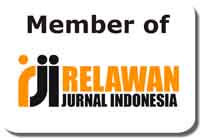Learning English from Home during the Covid-19: Investigating Learners’ Experience for Online and Autonomous Learning
Abstract
Keywords
Full Text:
PDFReferences
Abidah, A., Hidaayatullaah, H. N., Simamora, R. M., Fehabutar, D., & Mutakinati, L. (2020). The Impact of Covid-19 to Indonesian Education and Its Relation to the Philosophy of “Merdeka Belajar.” Studies in Philosophy of Science and Education, 1(1), 38–49.
Agustina, D. (2017a). A Complex System if Teachers’ Beliefs and Practices in Developing Learner Autonomy in Indonesian Junior High School Context: A mixed-methods study. Victoria University of Wellington.
Agustina, D. (2017b). Teachers’ Understanding of Learner Autonomy in Indonesian Contexts: Findings from High Schools and Their Implications. Language and Language Teaching Journal, 20(02), 127–132.
Ardi, P. (2017). Promoting Learner Autonomy Through Schoology m-Learning Platform in An EAP Class at An Indonesian University. Teaching English with Technology, 17(2), 55–76.
Barrs, K. (2011). Mobility in Learning: The Feasibility of Encouraging Language Learning on Smartphones. Studies in Self-Access Learning Journal, 228–233.
Basham, J. D., Carter, R. A., Rice, M. F., & Ortiz, K. (2016). Emerging State Policy in Online Special Education. Journal of Special Education Leadership, 29(2), 70–78.
Benson, P. (2011). Teaching and Researching Autonomy (Second Edition). Pearson Education, Inc.
Benson, P., & Huang, J. (2008). Autonomy in the transition from foreign language learning to foreign language teaching. DELTA: Documentação de Estudos Em Lingüística Teórica e Aplicada, 24, 421–439.
Blidi, S. (2017). Collaborative learner autonomy. Springer.
Burns, M. (2013). Staying or leaving? Designing for persistence in an online educator training programme in Indonesia. Open Learning: The Journal of Open, Distance and e-Learning, 28(2), 141–152.
Churiyah, M., Sholikhan, S., Filianti, F., & Sakdiyyah, D. A. (2020). Indonesia Education Readiness Conducting Distance Learning in Covid-19 Pandemic Situation. International Journal of Multicultural and Multireligious Understanding, 7(6), 491–507.
Cirocki, A., Anam, S., & Retnaningdyah, P. (2019). Readiness for Autonomy in English Language Learning: The Case of Indonesian High School Students. Iranian Journal of Language Teaching Research, 7(2), 1–18.
Creswell, J. W. (2008). Educational Research: Planning, Conducting, and Evaluating Quantitative and Qualitative Research (Third). Pearson Education, Inc.
Gemin, B., & Pape, L. (2017). Keeping Pace with K-12 Online Learning, 2016. In Evergreen Education Group. Evergreen Education Group.
Godwin-Jones, R. (2011). Emerging Technologies; Mobile apps for language learning. Language Learning & Technology, 15(2), 2–11.
Hidayati, T. (2016). English Language Teaching in Islamic Education in Indonesia; Challenges and Opportunities. Englisia Journal, 3(2), 65.
Hidayati, T., & Diana, S. (2019). Students’ Motivation to Learn English Using Mobile Applications: The Case of Duolingo and Hello English. Journal of English Education and Linguistics Studies, 6(2), 189–213.
Hilao, M. P., & Wichadee, S. (2017). Gender Differences in Mobile Phone Usage for Language Learning. Turkish Online Journal of Distance Education, 18(2), 68–79.
Holec, H. (1981). Autonomy and Foreign Language Learning. Pergamon Press.
Kementerian Pendidikan dan Kebudayaan RI. (2020). Surat Edaran No 4 Tahun 2020 Tentang Pelaksanaan Kebijakan Pendidikan dalam Masa Darurat Penyebaran Coronavirus Disease (Covid-19).
Khotimah, K., Widiati, U., Mustofa, M., & Ubaidillah, M. F. (2019). Autonomous English learning: Teachers’ and students’ perceptions. Indonesian Journal of Applied Linguistics, 9(2), 371–381.
Lee, Y. H., & Kim, K.-J. (2018). Enhancement of student perceptions of learner-centeredness and community of inquiry in flipped classrooms. BMC Medical Education, 18(1), 242.
Lengkanawati, N. S. (2017). Learner Autonomy in the Indonesian EFL Settings. Indonesian Journal of Applied Linguistics, 6(2), 222–231.
Lie, W. W., & Yunus, M. M. (2018). Pen Pals Are Now in Your Finger Tips—A Global Collaboration Online Project to Develop Writing Skills. Creative Education, 09(15), 2491.
Littlewood, W. (1999). Defining and developing autonomy in East Asian contexts. Applied Linguistics, 20(1), 71–94.
Luschei, T. F., Dimyati, S., & Padmo, D. (2008). Maintaining e3‐learning while transitioning to online instruction: The case of the Open University of Indonesia. Distance Education, 29(2), 165–174.
Megawati, P. (2020). Persepsi Peserta Didik Terhadad PJJ Pada Masa Pandemi Covid-19. Jurnal Faktor UNINDRA, 7(2), 75–82.
Moore, J. L., Dickson-Deane, C., & Galyen, K. (2011). e-Learning, online learning, and distance learning environments: Are they the same? The Internet and Higher Education, 14(2), 129–135.
Oktawirawan, D. H. (2020). Faktor Pemicu Kecemasan Siswa dalam Melakukan Pembelajaran Daring di Masa Pandemi Covid-19. Jurnal Ilmiah Universitas Batanghari Jambi, 20(2), 541–544.
Pasaribu, T. A. (2018). Challenging EFL Students to Read: Digital Reader Response Tasks to Foster Learner Autonomy. Teaching English with Technology, 20(2), 21–41.
Phithakmethakun, M., & Chinokul, S. (2020). Autonomy-Supportive English Language Instruction: An Experimental Study on Students’ Motivation in English Language Classrooms. Language Education and Acquisition Research Network Journal, 13(1), 94–113.
Picciano, A. G., & Seaman, J. (2007). K-12 Online Learning: A Survey of U.S. School District Administrators. In Sloan Consortium (NJ1). Sloan Consortium.
Pujilestari, Y. (2020). Dampak Positif Pembelajaran Online Dalam Sistem Pendidikan Indonesia Pasca Pandemi Covid-19. ’ADALAH: Buletin Hukum & Keadilan, 4(1), 49–56.
Reinders, H., & Lazaro, N. (2011). Beliefs, Identity and Motivation in Implementing Autonomy. In Identity, Motivation, and Autonomy in Language Learning (pp. 125–142). Multilingual Matters.
Reinders, H., & White, C. (2016). 20 Years of Autonomy and Technonoly: How Far Have We Come and Where to Next? Language Learning, 20(2), 143–154.
Rusli, R., Rahman, A., & Abdullah, H. (2020). Student perception data on online learning using heutagogy approach in the Faculty of Mathematics and Natural Sciences of Universitas Negeri Makassar, Indonesia. Data in Brief, 29, 105–152.
Sari, E. R. (2012). Online learning community: A case study of teacher professional development in Indonesia. Intercultural Education, 23(1), 63–72.
Singh, V., & Thurman, A. (2019). How Many Ways Can We Define Online Learning? A Systematic Literature Review of Definitions of Online Learning (1988-2018). American Journal of Distance Education, 33(4), 289–306.
Smith, R., Kuchah, K., & Lamb, M. (2018). Learner Autonomy in Developing Countries. In A. Chik, N. Aoki, & R. Smith (Eds.), Autonomy in Language Learning and Teaching (pp. 7–27). Palgrave Macmillan UK.
Suni Astini, N. K. (2020). Tantangan Dan Peluang Pemanfaatan Teknologi Informasi Dalam Pembelajaran Online Masa Covid-19. Cetta: Jurnal Ilmu Pendidikan, 3(2), 241–255.
Wargadinata, W., Maimunah, I., Dewi, E., & Rofiq, Z. (2020). Student’s Responses on Learning in the Early COVID-19 Pandemic. Tadris: Jurnal Keguruan dan Ilmu Tarbiyah, 5(1), 141–153.
Yildirim, Ö. (2008). Turkish EFL Learners’ Readiness for Learner Autonomy. Journal of Language and Linguistic Studies, 4(1), 65–80.
Yudhiantara, R. A., & Nuryantini, A. Y. (2018). Instagram-Assisted Language Learning in Islamic Higher Education: Toward Online Collaboration. JEELS (Journal of English Education and Linguistics Studies), 5(2), 189–210.
DOI: http://dx.doi.org/10.31332/lkw.v0i0.2223
Copyright (c) 2020 Tuti Hidayati, Faizatul Husna

This work is licensed under a Creative Commons Attribution-ShareAlike 4.0 International License.
Publisher:
UPT Pengembangan Bahasa, IAIN Kendari
Jln. Sultan Qaimuddin No. 17 Baruga, Kota Kendari, Sulawesi Tenggara
Website: upb.iainkendari.ac.id
Email: [email protected]


















